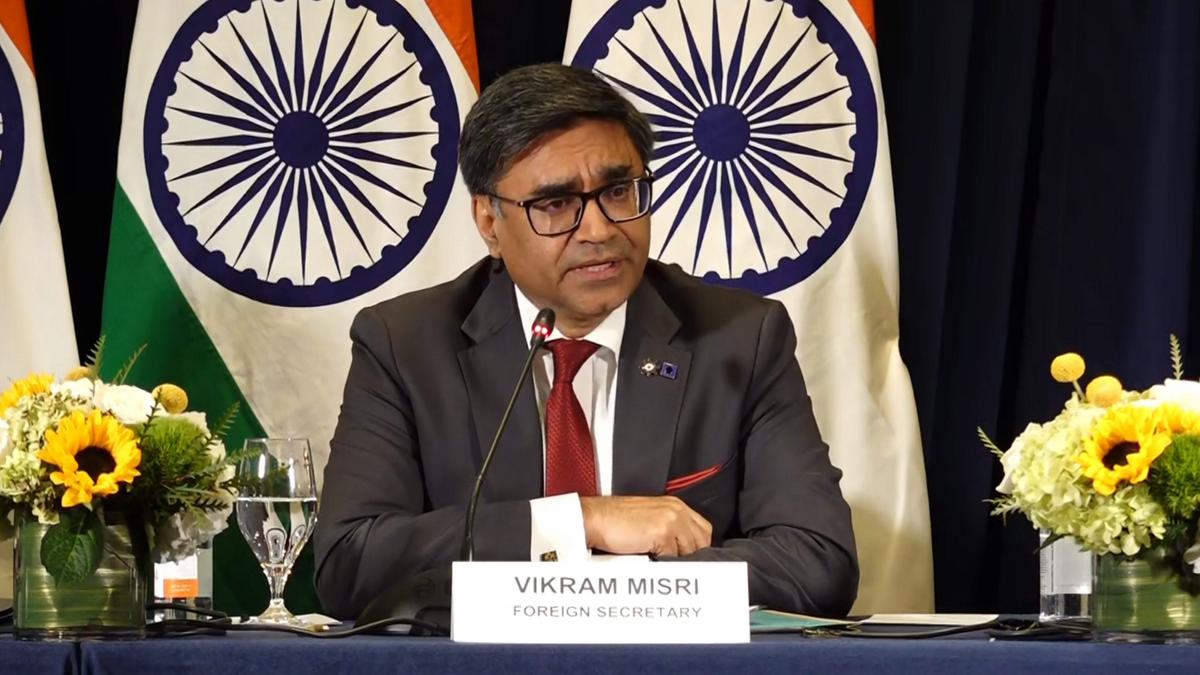Foreign Secretary Vikram Misri briefs the media regarding Prime Minister Narendra Modi’s visit to the US, in Washington, on February 14, 2025.
| Photo Credit: PTI
The government rejected U.S. President Donald Trump’s offer to “help” in ending India-China border tensions, which echoed his previous offer to mediate after the Galwan clashes in 2020. The comments were made by Mr. Trump during his joint press conference on Thursday (February 13, 2025) in Washington with Prime Minister Narendra Modi by his side.
While Prime Minister Modi didn’t react to the offer, Foreign Secretary Vikram Misri made it clear, in a briefing later, that the issues are being handled bilaterally, even as China responded sharply to Mr. Trump’s comments on the Indo-Pacific.
“Whatever issues we have with any of our neighbours, we have always adopted a bilateral approach to dealing with these issues,” Mr. Misri told journalists at the end of Mr. Modi’s 24-hour U.S. visit. “It is no different between India and China. We have been discussing any issues we have with them on a bilateral plane, and we will continue to do so,” Mr. Misri added, referring to recent talks and the resumption of bilateral dialogue mechanisms, including his own visit to Beijing in January.

Addressing a joint press conference, Mr. Trump side-stepped a specific question about India’s role in resolving the Russia-Ukraine conflict, instead saying that China could have a role.
“I think that China is a very important player in the world. I think they can help us get this war over with Ukraine and Russia, and I look at India, I do see the skirmishes on the border, which are quite vicious, and I guess they continue to go on,” Mr. Trump said.
The Indian Army and the People’s Liberation Army of China have not at present spoken of any clashes, especially after they had announced a détente resolving the last part of the stand-off at the Line of Actual Control (LAC) in October 2024.
“If I could be of help, I’d love to help, because that should be stopped. That’s been going on for a long time, and it’s quite violent. It’s quite violent, but I would hope that China and India and Russia and us and all of us can get along,” Mr. Trump continued. When asked the same question, Mr. Modi repeated his 2022 formulation to Russian President Vladimir Putin that “this is not the era of war”, and said that India was “not neutral, but on the side of peace”.
On denuclearisation
Mr. Trump then went on to talk about the threat of nuclear weapons in the world, and said that as soon as he had dealt with the conflicts in Ukraine and in Gaza, he would meet with his Chinese and Russian counterparts, Xi Jinping and Mr. Putin, to discuss “denuclearisation”.
However, Mr. Trump was not as amicable about the BRICS grouping of emerging countries that comprises Russia, China and India and has inducted new members, including Iran, the UAE, Egypt and Indonesia. Earlier, during his announcement that reciprocal tariffs would be imposed worldwide, Mr. Trump said that his threat to impose 100% tariffs on BRICS countries if they attempted to sidestep the dollar had ensured that “BRICS is dead.”
Referring to a decision by India and the U.S. to convene meetings of the India-Middle East- Europe-Economic Corridor (IMEC) and the I2U2 (India, Israel, the UAE, and the U.S.), that have both been suspended due to the conflict in Gaza, Mr. Trump said they intended to build a trade route from “India to Israel to Italy” and then to the United States.
China, Pakistan flay remarks
Meanwhile, both Beijing and Islamabad hit out at the U.S. President for offering F-35 fighter jets to India, as well as the joint statement’s initiatives for the Indo-Pacific region, including the launch of an Autonomous Systems Industry Alliance (ASIA) for industry partnerships.
“No one should make China an issue in the relations and cooperation between countries, or seek to instigate bloc politics and confrontation,” Chinese Ministry of Foreign Affairs spokesperson Guo Jiakun said on Friday, adding that “the Asia-Pacific is a stellar example of peace and development, not an arena for geopolitical games.” He also warned in a veiled reference to the Quad grouping that “bloc politics” would not keep the Asia-Pacific region “peaceful and stable”.
Pakistan Ministry of Foreign Affairs spokesperson said Pakistan was “deeply concerned” about advanced military transfers from the U.S. to India. “Such steps accentuate military imbalances in the region and undermines strategic stability,” the spokesperson added.
Published – February 14, 2025 10:31 pm IST
